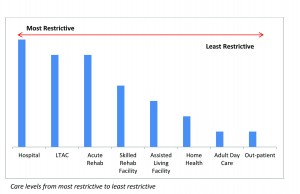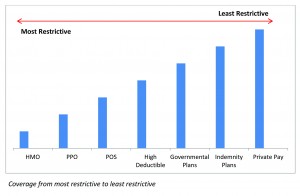
by Kim Kilday, MBA, MHA
People plan their work day, vacations – even grocery shopping trips to maximize coupon savings. Pre-planning an individual’s healthcare is no different. In the absence of planning, an individual could make healthcare decisions during stressful situations – they could be groggy from surgery or in pain, be concerned about their future ability to engage in physical activity they once enjoyed. Some could be fearful of a loss of control. Family and caregivers equally are under stress when helping their loved one to make decisions about the next steps following a hospitalization.
Proactively looking at the options along the continuum of care and knowing what your insurance plan covers are key. The healthcare industry offers a variety of care levels, each with distinct costs and insurance or coverage rules to follow. Most individuals know the co-pay amount for a physician visit or prescriptions. The details get trickier when accessing other levels of care.
Options along the Transitional Path of Care
A hospital stay typically begins a patient’s initial transition to a lesser level of care depending upon their medical condition. Skilled rehabilitation facilities (SRF) offer a short stay option for individuals requiring the monitoring of a medical condition or for strengthening and conditioning before transitioning to home. This level of care allows a patient to continue an aggressive therapy plan that supports a safe discharge to home.
 The clinical team may determine with the patient, that continuing physical, occupational or speech therapy at home with home health or out-patient services are necessary. Therapy in the home environment or out-patient services, allow the patient to continue building upon what they learned in the hospital, in acute rehab or skilled rehab and experience a progression in their functional levels. Connecting patients with the appropriate level of care supports the interest of reducing the chance of readmitting to the hospital within 30 days of discharge.
The clinical team may determine with the patient, that continuing physical, occupational or speech therapy at home with home health or out-patient services are necessary. Therapy in the home environment or out-patient services, allow the patient to continue building upon what they learned in the hospital, in acute rehab or skilled rehab and experience a progression in their functional levels. Connecting patients with the appropriate level of care supports the interest of reducing the chance of readmitting to the hospital within 30 days of discharge.
Crucial conversations with the doctor or surgery scheduler about the plan beyond a hospital stay will help form the blue print for post-acute support. In light of limitations following surgery, think about the support needed for basic daily living such as moving through the house, cooking, basic household maintenance like cutting the grass or managing the care of pets.
Insurance Coverage Considerations
While moving along the transitional path of care makes sense clinically because there is a progression of improvement, choosing to access services at various levels of care allows a patient to maximize the insurance benefit in exchange for the premiums that have been paid. It also reinforces the importance of therapeutic interventions that promote a successful return home.
While there are different clinical levels of care a patient may use to support their quest for better health, there are also financial considerations. Insurance plans are available that act as a substitute for traditional Medicare, called Medicare Advantage (MA) plans. These MA plans originated with the passing of the Balanced Budget Act of 1997 and gave Medicare beneficiaries the option to choose managed care plans rather than traditional Medicare A and B coverage.  These plans have a wide range of coverage depending upon what was purchased and operate like a commercial insurance plan with requirements including pre-certification or notification.
These plans have a wide range of coverage depending upon what was purchased and operate like a commercial insurance plan with requirements including pre-certification or notification.
There are provider networks, daily co-pays amounts, deductibles and out of pocket maximums the member is responsible to pay to the provider. Knowing these amounts beforehand lets the individual include them in their post-acute plan.
Liberty Healthcare and Rehabilitation Services offer patients the option to pre-plan for health services. This allows the patient to discover what to expect from their healthcare experience and to focus their energy on healing while recovering in the hospital. It de-mystifies the health care experience and keeps the patient and their family involved in the plan. For more information, call the Admissions office at Royal Park at (704) 849-6990 or The Pavilion Health Center at Brightmore at (980) 245-8500. For more information: www.libertyhcs.com



